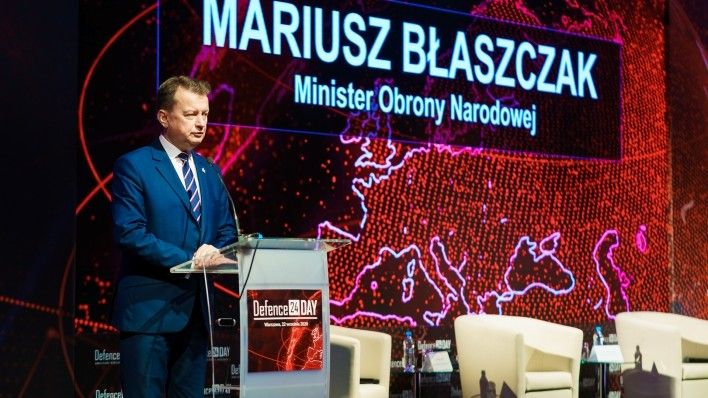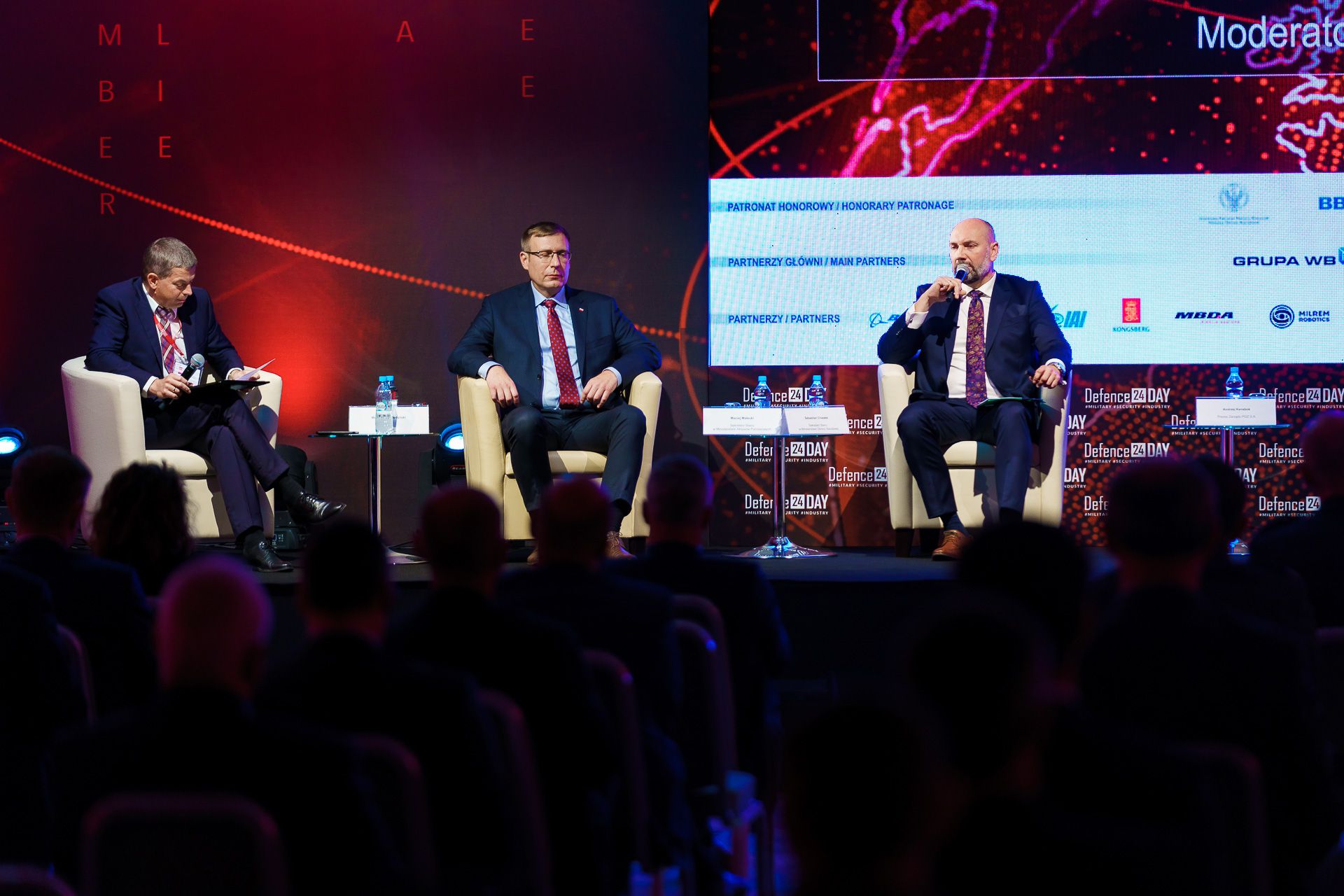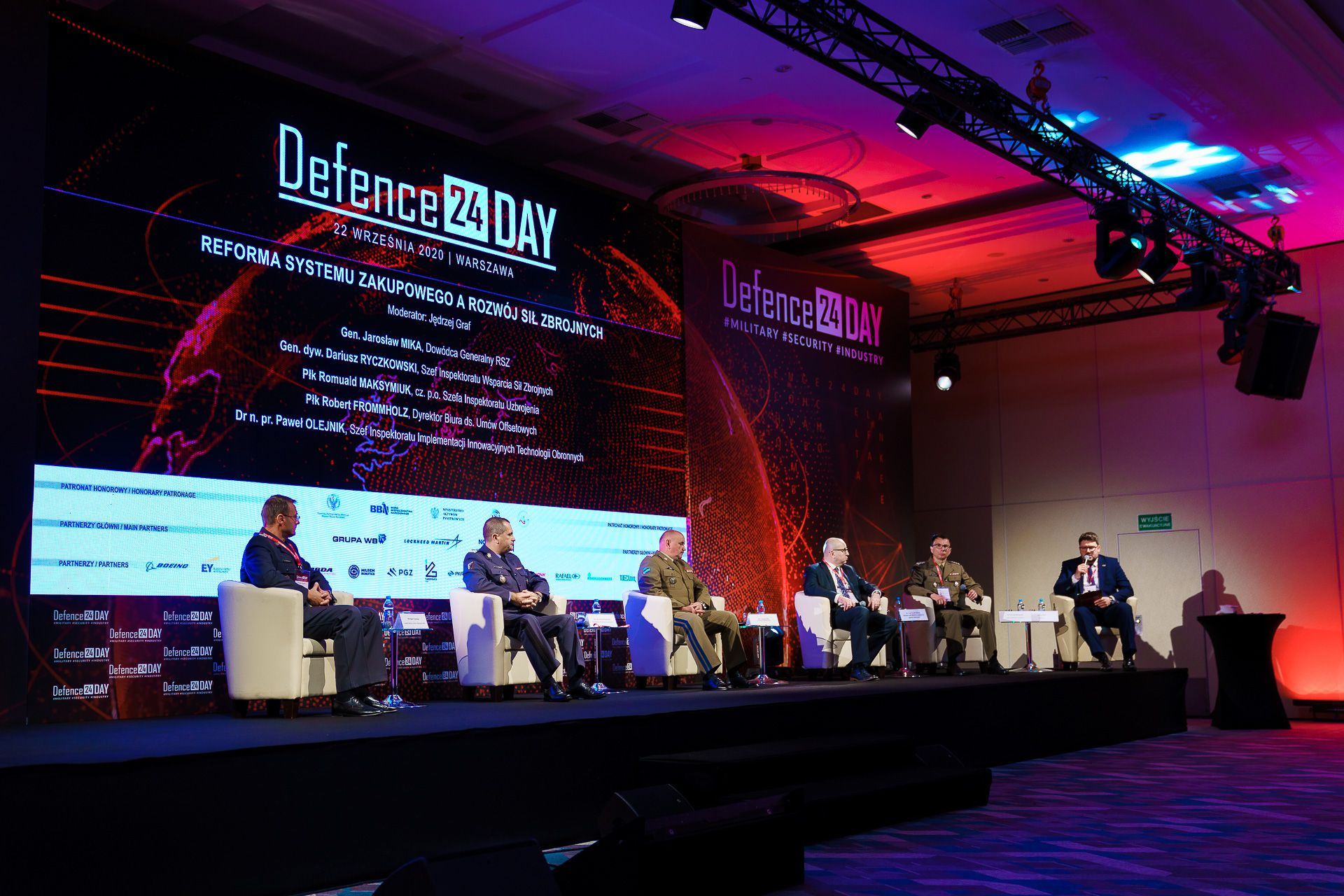Strona główna
Błaszczak: We must shorten the path from concept to induction

So far, the procurement system was “cursed by the knowledge”. The Armed Forces, knowing how demanding the contemporary operational theatre is, were defining the requirements concerning the equipment in an idealized manner, thus, impossible to be delivered. This is about to change now. With a mutual benefit for all of the parties involved, Polish Defence Minister Błaszczak told us.
Jędrzej Graf: During the Defence24 DAY you have presented a concept to bring the Armament Agency to life. What is the schedule adopted within that regard? In what time you expect the relevant bill to be adopted? When the new body should begin its operations, and when is it going to be completely ready?
Mariusz Błaszczak, head of the Polish MoD: The establishment of the Agency of Armament would fundamentally reshape the modernization process in the Polish military. Change at that scale, with relevance for the national defence of this caliber, must be a matter of evolution that is perfectly prepared. We are speaking about an organ that would spend several, or even several dozen billion zlotys per annum. And more money would come in the future, as the financing of the Polish Armed Forces would reach the level of 2.5% of GDP. We cannot afford for these assets to go to waste, or to be used ineffectively. Competency and sound management need to be our most resilient assets. Only then would we achieve the maximum return of every zloty spent, presenting itself in military equipment tailored to our needs, expectations and capacity.
I assume, and the plan is for the Agency to take organizational and structural shape next year. It could be said that it would be the so-called year-zero, after which the Agency would achieve full functionality. The key matter, as for now, is to efficiently and diligently execute the legislative effort - adopt the Act and surround it with secondary legislation. The current system is sometimes inefficient or paralyzed by the scattered decision-making process and expansive bureaucracy. My goal is to create a single agency that would be managed in a modern manner, that is also to be efficient and gather all of the necessary instruments. That Agency would become the sole decision-making body in the domain of the procurement done with the Polish Armed Forces in mind.
One needs to remember that the above is also a tangible way to implement the provisions of the National Defence Strategy, as prepared by President Andrzej Duda.
The Armament Agency is to fuse several bodies, e.g. the Armament Inspectorate, the I3TO Inspectorate for Implementation of Innovative Defence Technologies or the Offset Bureau. It would also take over some of the competencies from other entities. In what way that would be done, organization-wise? Would the entities that would be gathered within the Armament Agency, as a whole, as it launches its operations, formed into a division or department of the new Agency, or would entirely new structures be established, including the elements of the existing organs?
We are speaking of a generational change for the whole military procurement system. Disbanding, transfer or consolidation of several key entities procuring the equipment for the military into a single organism poses a challenge comparable to establishment of a new branch of the military. The difference here is that the Agency would not be established from scratch, but using the existing entities - the Armament Inspectorate, the Inspectorate for Implementation of Innovative Defence Technologies, and the Offset Agreements Bureau. Of course, using the personnel, organizational culture and institutional memory of theirs as well. At the same time, the Agency would take over some of the specific tasks and tools of the Military Centre for Standardization, Quality and Codification, and some of the specific tasks and tools of the Military Property Agency, and the Armed Forces Support Inspectorate. It will also make its own contributions at the Armament Policy Department of the Polish Ministry of Defence We want to use synergy to utilize what's already has been built and proven, and we want to create new solutions. We are also taking a closer look at good practices in other states, analyzing them and coming to conclusions of our own. As I stressed, it sometimes happens that the issue is not related to the sparse wallet, but to the scattering of the workforce that has that wallet at its disposal.

What's important, the Armament Agency term does not only cover the area of procurement and delivery of the military equipment for the units of the Armed Forces. Within the new system, the Agency is to manage the whole lifecycle. Starting from "listening" to what the Armed Forces need, identifying the product on the market, through the tendering, negotiation, and procurement procedure, to the so-called maintenance support and decommissioning of the equipment. Furthermore, the Agency would be carrying out the processes related to the offset deals, to the definition of the Basic National Security Interest, and to the R&D effort. It would also be dealing with marketing abroad. Thanks to the gathering of so much capacity within a single space, numerous processes could be taking place in parallel. This should multiply the effectiveness and minimize the time frame required to induct the new types of armament, equipment and munitions. And time is of the essence here.
Is the whole structure of the Armament Agency known already? To what extent it would be created from scratch, and to what extent, referring to the last question, would it be a certain kind of fusion of the existing organs?
The Agency is to be 100% focused on goals and tasked, not being tightly tied to any schemes. It is through consolidation that we are going to shift the center of gravity towards the knowledge-based entities, diminishing the administrative bodies. The core of the agency would be based on specialized departments and bureaus headed by knowledgeable directors. However, this would not be a 1:1 transition. The new structure is expected to be pragmatic in its nature, adapted to the requirements of the 21st Century.
It remains an open question as to what relationship would be established between the Polish Ministry of Defence, the future Agency and the PGZ Group. In the setting that envisages ownership supervision that the Agency would have over PGZ S.A., the structures of both entities would need to be tailored to this, so that establishment of redundant positions and functions is avoided. And we are ready for that as well.
In what way are you going to handle the functioning of military procurement departments until the moment when the new Agency is fully organized?
I can assure you there is no risk that the procurement and delivery process is interrupted. This would contradict the idea of establishing a new system. Any actions within that regard will have a planned and evolutionary profile. This would require some imagination, good planning and unconventional ways of thinking, but this is how the new Agency is to work. Furthermore, we are not starting from scratch. We have managed to do a lot until now. Numerous modifications are already functioning within the existing system, and they would be transferred to the new body. All of the parties involved are well aware of how important the project involving them is. Thus, I am not worried about interruptions. We expect numerous challenges, but we also want to face them.
In what way the employees and troops, working at the new Agency, would be selected? Would they come from the existing structures? Is the Armament Agency going to remain open for civil domain specialists, with the law or economic know-how?
The Agency would be, primarily, open to skills, qualifications and expertise. This will be the decisive factor in the selection of the personnel. We have numerous defence domain, armament systems, law, economy and procurement experts. We must put this potential into use and develop it further. We are open towards the civil market, as well as towards the retiring officers. A mix of military know-how and market-driven, civil attitude is desirable. This would allow us to gain a broader perspective.
During the Defence24 DAY, we have also been discussing the matters related to the recruitment of proper HR. Are any specific purpose solutions expected to be introduced when it comes to remuneration for the civil-background employees of the Agency, to encourage the persons within the job market? This matter had been frequently indicated as a problematic one.
The new agency would put the strength and know-how of its people into use. This is why the matter of increase of pay, professional development and the attractive nature of the jobs are all a subject of our efforts. We are well aware of how the job market looks, and that the argument of getting a job at an innovative, mission-driven entity may not be enough in some cases. This is why the financial aspect also needs to be present here. Especially in the light of the fact that the Agency would need to compete to employ the best experts out there.
The Armament Agency is to take over some of the responsibility of the Support Inspectorate when it comes to the support of the operational use of the equipment, and at the same time, the Inspectorate would still be dealing with the "military" logistics. To what extent would the new institution be responsible for supporting the operational use of the equipment? Would this support cover the scope within which cooperation with the manufacturer is required, or any other area (if so - what?)?
As I already said, the Agency would have a really broad catalogue of activities, including the tasks that so far have been assigned to the Support Inspectorate. The new body would consolidate two areas: procurement of the key material assets and the critical operational maintenance area, [related to] the so-called lifecycle of the military equipment. Changes in the latter domain fall well within the priority assumptions of the whole reform. This corresponds with the principle: I bought it, I maintain it, I withdraw it.

During the Defence24 DAY, references were being made, to the role that the new institution would play in the process of defining the requirements. In the current conditions, it seems deficient. How the relationship between the Armament Agency and the entities responsible for the requirements definition (Administration and Development Branches, the General Staff)? To what extent defining the needs and requirements would fall within the scope of responsibility of the aforesaid institutions, and to what extent would the Armament Agency be dealing with that matter?
First, at the moment we are functioning in a system in which, frequently, the operational requirements are fictional, as products with the given specification sheet do not exist or manufacturing of those products is excessively expensive. Thus, this area needs to urgently become more realistic. We must shorten the path from concept to induction. And this is also a matter that the Agency would be dealing with. The Armed Forces are only to define the capabilities, while the Agency shall develop proposals of specific products and carry out any of the required formalities afterwards. Simplification of the system is required.
I assume that this change is one of the most important ones. So far, the procurement system was “cursed by the knowledge”. The Armed Forces, knowing how demanding the contemporary operational theatre is, were defining the requirements concerning the idealized equipment, thus, impossible to be delivered. This is about to change now. With a mutual benefit for all of the parties involved.
When it comes to the General Staff of the Armed Forces, it would still be involved in defining the requirements or of the required capabilities. Furthermore, the General Staff would also be obliged to review the modernization priorities. A situation in which all programmes are viewed as a priority is unacceptable, as then, none of those programmes is prioritized.
As of 2021, the new Public Procurement Law Act would become valid, and this could also influence the military procurement processes. Throughout the consultation process, the Polish Ministry of Defence had numerous remarks, and not all of them have been taken into the account. Are the Ministry, and the new entity going to be ready to work, in the conditions defined by the new Act?
We are ready for the new regulations. This has been confirmed in the bill, concerning the Agency. I would like to stress the fact that military procurement should be viewed through a different lens than the one applicable to other market purchases. Still, the above does not change the fact that the procedural framework of the new agency would be aligned with the legal regulations completely. This applies both to the currently valid law, as well as to the newly introduced regulations.
So, as the Armament Agency is brought to life, would new legal regulations be introduced with regards to military procurement, also within the scope of the exclusion of the given procurement from the coverage of the public procurement law, at the Act level?
I would like the Polish military to, where it would be possible, award "in-house" orders - namely, to accomplish the procurement process within own scope, with the use of own assets, within the framework of own enterprise. Here, we are referring to the PGZ Group that would be supervised by the Agency, obviously. But to make this happen, the PGZ Group would need to be transferred under the MoD's supervision (or under the supervision of the Agency of Armament). An Act of Law should be then issued, defining how public procurement should be done, when it comes to the acquisitions that would bear a base significance for national security.
On the occasion associated with the establishment of the Armament Agency, it was also said that internal regulations at the Polish Ministry of Defence would be changed, with regards to the military procurement, it is a natural process. Within what scope would the potential changes as such be taking place, and in what direction could they progress?
The changes in the acquisition of equipment, in the legal regulations and in actual, real-life, are expected to be comprehensive and have a long-term profile. Thus, they have become a part of the Strategy for Responsible Development. These are to optimize the whole weapons and equipment procurement process for the Polish Armed Forces but in collaboration with the Polish defence industry sector. Let me recall, that last year has seen a very good result at the end of it, with more than 60% of modernization expenditure forwarded to the Polish facilities. And I will be trying hard to keep that trend alive. My goal is to make the Polish military modern and quantitatively enlarged, using the Polish equipment where possible. Thus, I would be supporting the domestic defence industry facilities, investing in the development of these. Let us remember, the sovereignty of military equipment deliveries is one of the primary determiners of the high level of capabilities in the Armed Forces.
In what way the assessment of the Basic National Security Interest would be reformed? How would it influence the offset-related matters and the course of the offset procedures?
First, the aforesaid areas would be consolidated. This would make it possible to coordinate them properly and to make use of the full range of solutions. I think that the assessment of the Basic National Security Interest alone should indicate whether the offset is necessary or not. This would simplify and accelerate the process significantly. We all know how important the offset is for our economy, within the context of technological advancement and of maintaining the competitiveness. Nonetheless, some capabilities need to be provided, regardless of the additional conditions. Here, I am referring to the areas that bear critical importance for Poland's defence. Thus, the new Agency needs to find a balance between the price, quality and technological benefits. Its recommendation would be key here.
Thank you.
